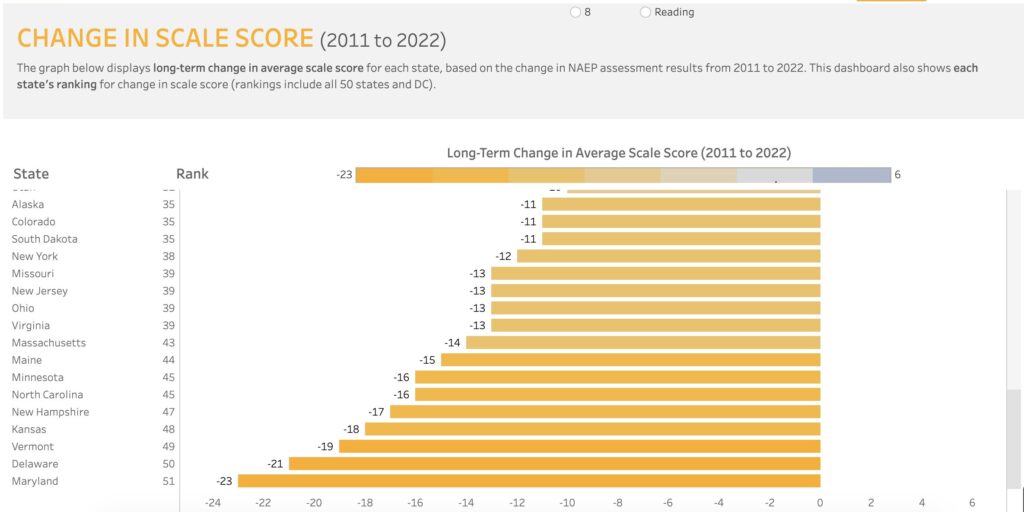
Senator Turner: Given NAEP Scores, Let’s Set Up a Pilot Program to Extend the School Year
October 26, 2022
In One Hour, JerseyCAN’s Director Will School State Assembly On What Our Kids Need To Start Recovering from Covid Learning Loss
October 27, 2022Murphy’s Education Department Is Failing Parents and ‘All the Children Across the State of New Jersey’
If you’ve been following the news you already know that on Monday the National Assessment for Educational Progress (NAEP) released state scores from last Spring’s tests. New Jersey students lost significant amounts of learning. But here’s what you may not know: New Jersey students, typically high-performing, lost more learning than many students in other states. According to the results, when states are ranked by the degree of learning loss, New Jersey comes in at #39.
What has been the reaction of the New Jersey Department of Education?
Radio silence. Except for tweets from Atlantic City:
LAST WORKSHOP DAY: Acting Commissioner @DrAllenMcMillan and workshop guests visit the @NewJerseyDOE booth @njsba @NJASANews #NJASBO #Workshop2022 @ACConvention. pic.twitter.com/xKb6MHFBzM
— New Jersey Department of Education (@NewJerseyDOE) October 26, 2022
When North Jersey requested a comment from the DOE, especially in light of FutureEd’s conclusion that 8th-grade NJ students had (with the exception of West Virginia, Delaware, and Oklahoma) the biggest math decline in the country, no one responded.
At least they’re consistent: Not only are they ignoring NAEP data, they’re also declining to release state test scores that were given six months ago. This matters: as Andy Rotherham explains, “states must also make sure state assessment results are clearly communicated in a timely manner — and that those results are an honest representation of what’s going on.” States that leave parents in the dark about student proficiency—like NJ—are failing to give them “a clear and honest sense of the problem.”
Rotherham continues,
Obviously, states and school districts should provide support to students and families such as tutoring, direct grants to parents, expanded choice options, longer school days and a longer school year for students. This is so obvious it should be unremarkable.
JerseyCAN’s Executive Director Paula White told WBGO that there’s “no word” on when the state will release the data, which it has had for some time.
“We’ve heard nothing from the state, they have not issued a specific date about when they’re going to publish that data on the state’s website, when are they going to have conversations about it,” she said, “and so that really leaves advocates and people who really care about the children, all of the children across the state of New Jersey, that leaves us in the lurch.”
White said there is no justification for this delay.
The tests were administered between April, sort of mid-April to early May, and again it would be different if no results were being made available but the results have been made available at the level of the parent and at the level of the district and so why not at the level of the state?
Here is a drill-down from FutureEd of New Jersey students’ declines on NAEP:
- In 2019, 42% of fourth graders were proficient in English, but in 2022 that number dropped to 38%.
- In 2019, 48% of fourth graders were proficient in math, but in 2022 the number dropped to 39%.
- In 2019, 43% of eighth graders were proficient in English. The results remained mostly the same, with a 42% proficiency in 2022.
- In 2019, 44% of eighth graders were proficient in math, but in 2022, only 33% were proficient.
- As the chart below shows, New Jersey students’ declines were among the sharpest in the country:





